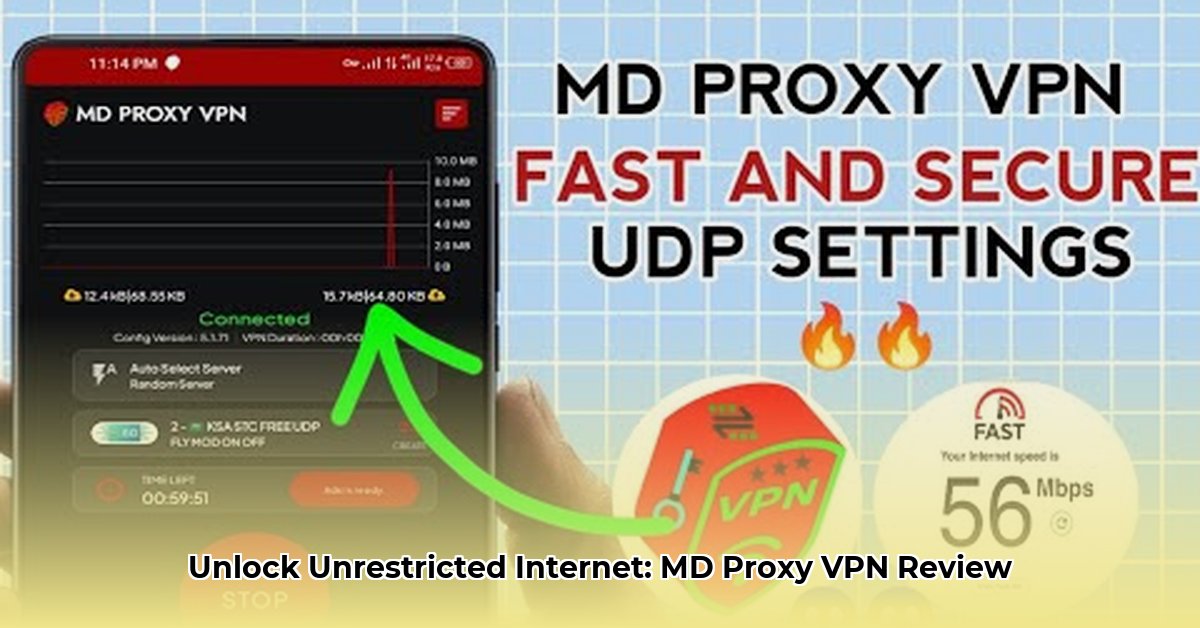
MD Proxy: A Multi-Protocol VPN Under Scrutiny
MD Proxy VPN promises secure browsing and access to restricted content through a variety of protocols. This review critically examines its claims, focusing on performance, security, and privacy. We aim to provide a balanced assessment, highlighting both potential benefits and significant shortcomings. The lack of transparency surrounding key aspects necessitates caution. Is MD Proxy VPN's multi-protocol approach a genuine advantage, or does it mask underlying vulnerabilities?
A Protocol Pantry: Variety, But Is It Truly Better?
MD Proxy boasts OpenVPN (OVPN3), HYsteria UDP, SSH, and DNSTT protocols. This breadth of options could cater to diverse user needs and network conditions. OpenVPN prioritizes security and speed; HYsteria UDP aims at circumventing restrictions; SSH offers a robust, established approach; and DNSTT facilitates DNS tunneling. However, the presence of multiple protocols doesn't automatically equate to superior security or performance. Independent, verifiable benchmarks are crucial to assess the actual efficacy of each protocol under different conditions. Without such testing, claims of superior performance remain unsubstantiated.
Performance: Substantiating the "Blazing-Fast" Claim
MD Proxy's "blazing-fast speeds" claim lacks empirical evidence. A thorough review demands independent performance benchmarks, comparing download and upload speeds across various servers and network conditions. Without this data, the claim remains marketing rhetoric. This absence of transparency raises concerns regarding the VPN's overall reliability and trustworthiness. How can users assess true performance without independent verification?
Security: A Critical Need for Transparency
Security is paramount for any VPN. Yet, MD Proxy's security details are strikingly sparse. Crucial information, such as the specific encryption algorithms employed, the existence of independent security audits, and the precise details of their no-logs policy, remains undisclosed. Without this transparency, users cannot fully evaluate potential vulnerabilities. A responsible VPN provider should openly share this crucial information. This lack of transparency is a major cause for concern.
User Experience: Simplicity Without Compromising Security
The user interface is described as user-friendly, which is a significant advantage for less tech-savvy users. However, simplicity must not come at the expense of security. A simple interface could inadvertently obscure critical security settings or leave vulnerabilities open. A careful balance between ease of use and robust security configurations is essential. Further investigation is necessary to determine if this balance has been achieved.
Privacy: Addressing Server Locations and Data Retention
The absence of information regarding server locations is a significant privacy concern. Knowing server locations allows users to understand jurisdictional compliance and potential legal implications. A lack of a clearly stated data retention policy further exacerbates concerns regarding data handling practices. Without this critical information, users lack the ability to properly assess the potential risks to their privacy. This opacity undermines trust and hinders a comprehensive evaluation of MD Proxy's privacy commitment.
Pricing & Plans: Value Proposition Remains Unclear
Information regarding subscription plans and pricing is unavailable. This lack of transparency prevents meaningful comparison with competing VPN services within the marketplace. Cost is a vital factor for consumers; its absence hinders a complete assessment of MD Proxy's value proposition.
Risk Assessment Matrix
| Feature | Risk Level | Explanation | Mitigation Strategies |
|---|---|---|---|
| Protocol Variety | Moderate | Diverse protocols offer flexibility but require rigorous testing. | Independent testing and performance comparison needed. |
| Performance | High | Absence of benchmarks renders speed claims unverifiable. | Independent speed tests and comparison with competitors. |
| Transparency (Security/Privacy) | High | Inadequate security information prevents risk assessment. | Full disclosure of security protocols, audits, and privacy policy. |
| Server Locations & Data Retention | High | Lack of information creates uncertainty around privacy. | Transparency about server locations and data retention details. |
Conclusion: Proceed with Caution
MD Proxy VPN's multi-protocol support and user-friendly interface hold some appeal. However, significant concerns regarding security transparency and privacy outweigh these advantages. The lack of independent verification of performance and security claims makes a positive recommendation impossible. Until these shortcomings are addressed through full transparency and independent verification, users should exercise considerable caution. Exploring more transparent and fully vetted VPN alternatives is strongly advised.
How to Independently Verify MD Proxy VPN Security Claims
- Verify Encryption: Independently verify the strength of the encryption algorithms used.
- Seek Independent Audits: Look for reports from reputable cybersecurity firms.
- Examine the No-Logs Policy: Verify the existence and strength of a verifiable no-logs policy.
- Test for Leaks: Use online tools to check for DNS and IP leaks.
- Conduct Performance Testing: Use speed test services across various server locations.
- Analyze User Reviews: Scrutinize user reviews for credibility and potential bias.
- Understand Jurisdiction: Consider legal implications based on your location and the provider's.
⭐⭐⭐⭐☆ (4.8)
Download via Link 1
Download via Link 2
Last updated: Saturday, May 24, 2025